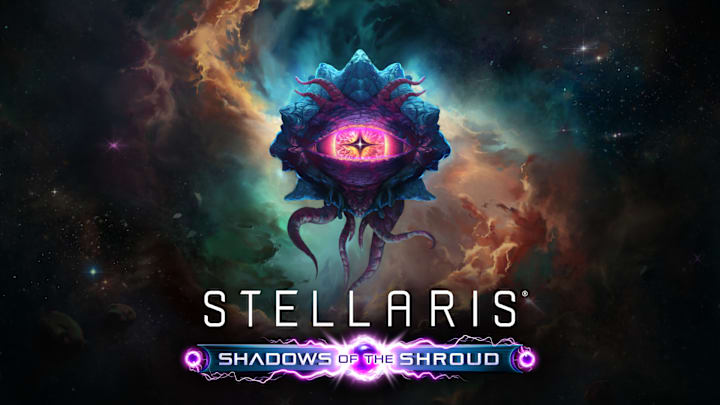Stellaris: Shadows of the Shroud review – Frienemies from beyond
By Marco Wutz

It’s always a wild ride when fantasy crosses over into science fiction, using the scale of the latter. Stellaris: Shadows of the Shroud is such a crossover, allowing your space empire to harness the powers of the kind of beings your Warlock from Dungeons and Dragons ordinarily consorts with. Since we’re talking about a grand strategy game here, though, these beings and powers operate on a galactic scale, enabling you to wipe out every single star in the galaxy with one blow, if you wish.
Now, some of this has been possible in Stellaris before Shadows of the Shroud, but the DLC greatly expands on the concept. The incomprehensible beings lurking beyond the Shroud are much more fleshed out and can be interacted with much more freely than before, if you dare to look behind the veil and sharpen your species’ Psionic powers.
Following this arduous path will allow you to win the support of the Shroud’s major powers as patrons, bestowing powerful buffs on your empire. But the more you open the gate, the more you allow the Shroud to leak into reality, the more it will shape your empire. It might even spill over to your neighbors, who may not be on board with you meddling with higher powers — not to mention polluting their worlds with the Shroud.
The patrons, of course, are playing by their own rules and if you want their continued support, you’ll have to behave in certain ways. Each patron comes with their own morale code. Follow their rules and you’ll find a content backer, but offend them too much and you’ll feel the stick instead of the carrot.
Shadows of the Shroud does for Psionic Ascension what The Machine Age and BioGenesis have done for the Synthetic, Cybernetic, and Biological Ascension paths: It offers a rework, making the boons gained from going this way more unique, rewarding, and flavorful, adding more narrative events to the playstyle as well as the Shroud mechanic.
Of course, each patron supports different flavors of the Psionic playstyle, giving you freedom in the way you want to express your empire’s mystic prowess — and how far you want to go. The Shroud is always a bit of a trap: It lures you in with boons and the promise of yet more power, but delve too far and you might find yourself becoming the endgame crisis in your endeavor to sacrifice the entire galaxy as your ascension ritual to evolve into a Shroud entity yourself.
Paradox has become very good at identifying and executing these specific power fantasies and Shadows of the Shroud is no exception. As always, the Shroud is there for you and others in all playthroughs, even if you don’t choose any of the three Origins coming with the DLC — and it’s a good thing, too, because I found the new Origins to be quite difficult to make work.
Take the Shroud-Forged Origin: It’s exclusive to machine empires and offers a straightforward path to piercing the Shroud and interacting with its denizens, but the process really screws up your economy, transforming a substantial part of your population into a smug Psionic elite that does little more than sit around on their robotic butts and meditate, huffing a special resource that fuels their Psionic abilities. Not only do these pops contribute little to your economy, they have increased upkeep costs. Advancing the event chain additionally requires you to expose your planets to the Shroud, making entire areas uninhabitable and unproductive.
Since having too many regular pops compared to the special ones hinders the event’s progress, I also had to halt the production of pops for a while, putting yet another brake on my economy. I went bankrupt at least once and had to watch helplessly – no money, no fleet – as a leviathan tore through my empire while I tried to pierce the Shroud.
Was it worth it? Kind of? My entire species became Psionic, I unlocked the Psionic Ascension path, and my high special resource production meant that I could explore the Shroud rapidly — but other than that, my empire was in shambles, because its economy was still in the dumpster. I half suspect that the constant transformation of my pops bugged out the system, because my worlds contained thousands of pops that belonged to “No Category” — they weren’t working any jobs, but also didn’t count as unemployed. They simply existed, causing upkeep costs to rise.
Suffice to say, as soon as neighboring empires saw my weakness and got hungry for territory, that campaign was over, Psionic powers or no.
Equally challenging, but for different reasons, is the Mindwarden Origin. The Mindwardens don’t want anything to do with all that space warlock nonsense and have one goal: Purge any traces of the Shroud from the galaxy, which means taking on some pretty beefy enemies. Luckily, they get some special tools to get the job done. There is also the Endbringers, a literal doomsday cult bringing some extremely fun options to the table.
A couple of additional Civics mix things up as well, including Secret Societies, which come with some great options for espionage-driven gameplay.
If you’re into the idea of Psionic Ascension – or being a force directly opposed to it – and have a good amount of gameplay experience, Shadows of the Shroud is an easy recommendation, as it goes leaps and bounds in fleshing out this style. If that’s not something you’re interested in, you can easily wait and pick it up during a sale.
Grand Strategy. PC. Stellaris: Shadows of the Shroud. Stellaris: Shadows of the Shroud review score. 7